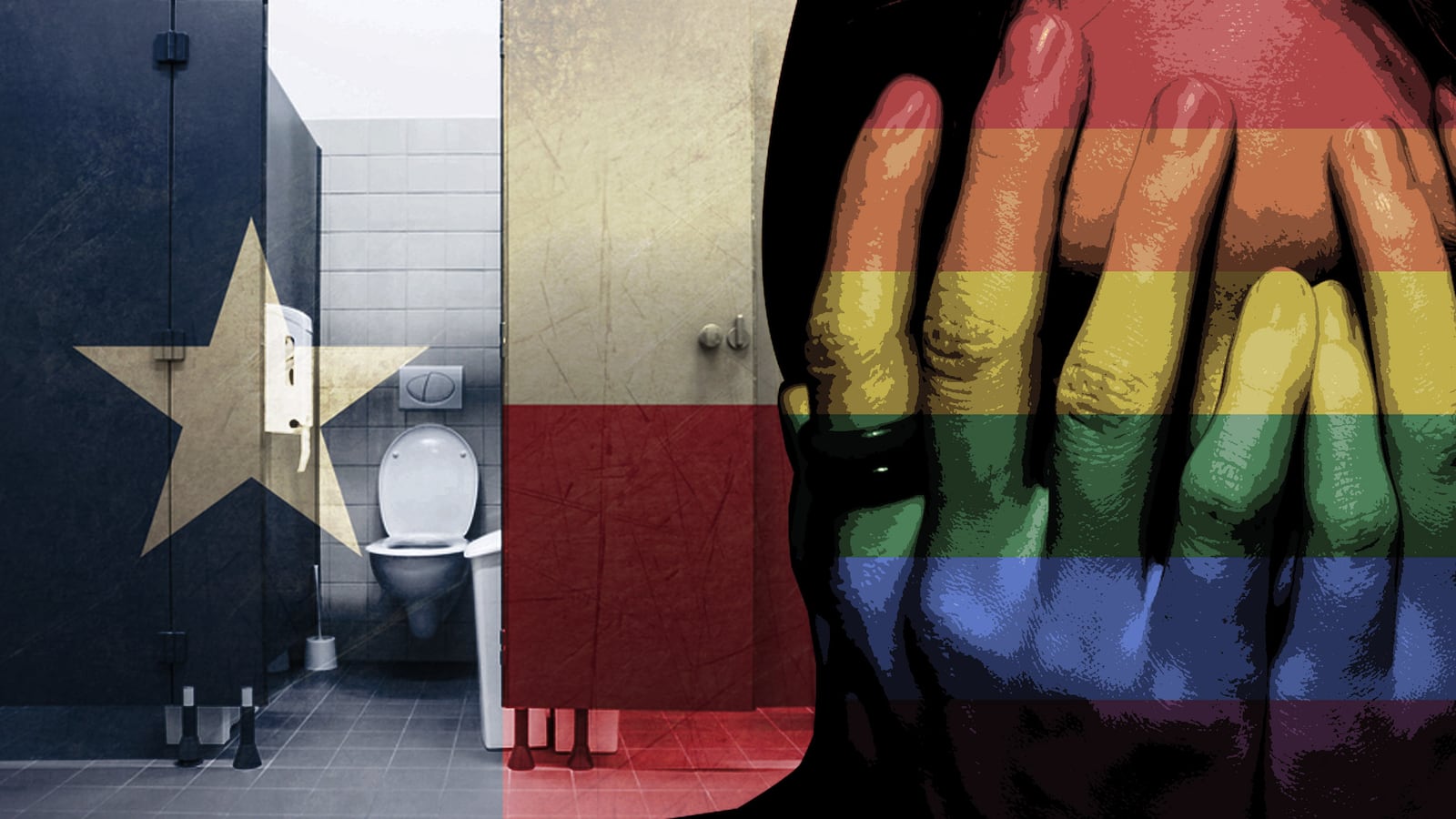Earlier this year, it looked like Texas might avoid passing anti-transgender legislation.
Now, the state legislature is preparing to pass not only the nation’s second bathroom bill but a sweeping piece of anti-LGBT adoption legislation as well.
Senate Bill 6, a bathroom bill similar to North Carolina’s infamous House Bill 2, cleared the state senate in March but Republican House Speaker Joe Straus had already said by that point that he’s “not a fan of the bill,” which would have restricted public restroom use by birth certificate and sparked significant economic backlash.
When SB6 failed to make headway in the house, however, Texas Republicans started trying to transform the stalling bill into an amendment that could be attached to another bill.
On Sunday night, those attempts finally came to fruition: The Texas state house successfully added anti-transgender bathroom restrictions for public schools to Senate Bill 2078 by a vote of 91-50.
This amended bill would, as the Texas Tribune reported, require transgender students in Texas schools to use separate single-stall facilities rather than the same multi-stall facilities as their cisgender peers—a requirement similar to the one that nearly sent Virginia high schooler Gavin Grimm’s case to the Supreme Court this year.
Also on Sunday, the Texas state senate voted 21-10 to pass House Bill 3859—a bill that, as The Daily Beast previously reported, would make it legal for state-funded adoption agencies in Texas to discriminate against same-sex couples and non-Christians under the guise of “sincerely held religious beliefs.”
HB 3859 could also give foster care organizations permission under that same banner to practice “conversion therapy,” the dangerous and medically discredited practice of trying to change someone’s sexual orientation or gender identity.
“Tonight, the state of Texas voted to advance two bills that discriminate against LGBTQ Texans,” said Equality Texas CEO Chuck Smith in a statement on the wave of advancing discriminatory legislation, adding: “Targeting some of the most vulnerable children in our state is abhorrent, shameful, and disgraceful. The Texas lawmakers on the 85th legislative session are on the wrong side of history.”
Virtually every major national LGBT organization—including the Human Rights Campaign, Lambda Legal, and the National Center for Transgender Equality—swiftly condemned the legislation as well, as did the American Civil Liberties Union of Texas.
“The Texas legislature is cynically advancing an aggressive agenda of discriminatory legislation for political gain,” said Rebecca Robertson, legal and policy director for the ACLU of Texas, in a statement. “The so-called bathroom amendment approved by the House last night is billed as a compromise, but there can be no compromise on discrimination.”
At this point, HB 3859 requires only the signature of Republican governor Greg Abbott to become law. The anti-transgender amendment to SB 2078 would first have to clear the state senate before heading to Abbott’s desk. Abbott, the Washington Post reported, has indicated he would sign a bathroom bill.
But it is Lieutenant Governor Dan Patrick, former champion of SB6, who has been most vocal in support of anti-transgender legislation, threatening special sessions last week if lawmakers didn’t take action.
"Against all actual facts, Lt. Gov. Dan Patrick is hell-bent on making transgender kids into scary villains,” said Jennifer Pizer, Lambda Legal Director of Law and Policy in a statement. “That's not just wrong and abusive: it's also begging to be sued. Didn't he notice what happened in North Carolina? The wrong-headed attack on transgender people backfired—expensively—for former Governor Pat McCrory.”
Indeed, between Sunday’s evening session—and the fact that the anti-transgender amendment has been awkwardly shoehorned into a piece of school safety legislation—a certain sense of déjà vu has surrounded the Texas legislature’s anti-LGBT efforts.
In March 2016, the GOP-controlled North Carolina state legislature hastily passed HB2 in a special session, regulating restroom access based on birth certificate and restricting the passage of non-discrimination legislation at the local level.
Then-governor Pat McCrory signed and vigorously defended the bill despite condemnation from human rights groups, high-profile litigation, and enormous economic backlash, including the potential loss of NCAA and NBA championship games. Not only did McCrory lose his re-election bid, the North Carolina state legislature was effectively forced to roll back some provisions of HB2 in order to win the NCAA back.
If Texas does pass SB 2078 as currently written, they will almost certainly face some economic backlash, although Republican House Speaker Joe Straus believes that it won’t be too bad, writing in a statement that the amendment—which only focuses on school restrooms rather than all public restrooms—“will allow us to avoid the severely negative impact of Senate Bill 6.” (The NCAA, as Vocativ’s Robert Silverman reported, has yet to weigh in on the legislation.)
The advance of SB 2078 also comes at an uncertain moment for transgender student rights on the national stage.
Under Attorney General Jeff Sessions, the Department of Justice has backed down from cases in which the federal government was slated to defend transgender restroom rights.
In February, the Trump administration rescinded Obama-era federal guidance instructing school districts that anti-transgender restroom restrictions would be considered violations of Title IX’s ban on sex discrimination in public education.
The removal of that guidance prompted the Supreme Court to remand Gavin Grimm’s high-profile case back to the circuit level for further deliberation.
Indeed, the Trump administration has explicitly signaled that they want this issue to be handle at a state level.
In defending the president’s stance on transgender student restroom rights in February, White House Press Secretary Sean Spicer said, “The president has maintained for a long time that this is a states’ rights issue and not one for the federal government.”
The Trump administration has effectively opened up a window the size of, well, Texas for states to restrict transgender students’ restroom usage.
The Lone Star state seems poised to jump through it.






